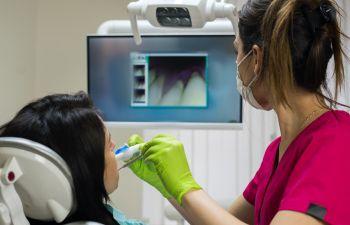
Oral cancer is a disease that affects the soft tissues in and around the mouth, which includes the tongue, throat, tonsils, salivary glands, and lymph nodes. As with any other form of the disease, oral cancer can be deadly if it is not diagnosed and treated while it is still in its early stages. At Fort Bend Dental, our experienced dentists understand the dangers of oral cancer, so we provide an oral cancer screening as part of our routine dental exams. During an oral cancer screening, we closely examine the tissues of the mouth and inspect the face, head, and neck for any growths or abnormalities. These screenings are vital to catching oral cancer before symptoms develop. For those individuals who do not undergo routine oral cancer screenings, there are several potential symptoms of oral cancer that signal it’s time for those in Missouri City, TX, to schedule an evaluation with one of our experienced dentists.
Sores or Ulcers
The soft tissues of the mouth are pretty delicate, so it is not unusual for sores or ulcers to develop. If a sore does pop up, but it heals within a week or two, it really should not be cause for concern. However, if a patient has a sore or ulcer that lingers and doesn’t seem to be healing well, it should be reported to an experienced dentist. Sores or ulcers that do not heal are one of the leading symptoms of oral cancer.
Discolored Tissue
Another common symptom of oral cancer is discolored tissue. This should not be confused with a darkening of the gums, which is a common symptom of periodontal disease. The discoloration that may develop in those with oral cancer often appears in patches. An individual may notice a patch of tissue that has turned white or red, or is a mixture of both colors. These small patches of abnormal tissue should be examined by a dental professional as soon as possible.
Pain in the Mouth or Throat
As oral cancer advances, it is likely to cause some discomfort. If a person is consistently experiencing mouth pain, it is likely a sign that there is a problem. Throat pain is another common complaint of those with oral cancer. This irritation often feels very similar to a sore throat, but the discomfort does not improve the way a sore throat caused by a cold would. Many individuals with oral cancer also report that it feels like there is something caught in their throat, which makes it difficult to swallow. Any lingering pain in the mouth or throat should be discussed with a dentist or general physician so that conditions such as oral cancer can be checked for.
Abnormal Growths or Lesions
Early on, oral cancer affects the soft tissues of the mouth, but initially, these changes can only be detected using special dental lights and equipment, such as those used by our dentists when performing an oral cancer screening. As oral cancer progresses, it is likely for the soft tissues of the mouth to develop more noticeable changes. Bumps, lumps, growths, and lesions are common symptoms of oral cancer. If the soft tissues of the mouth have changed in texture or developed any type of unusual growth, it is important to schedule an oral cancer screening.
Earaches
The head, mouth, nose, and ears are all connected, so when a problem develops in one area, it is likely to affect the others. As cancer cells grow, they can put pressure on surrounding organs. As such, it is common for individuals with oral cancer to suffer from persistent earaches. They may feel a constant dull pain that is very similar to the discomfort of an ear infection.
Contact Us
At Fort Bend Dental, our experienced dentists offer oral cancer screenings that allow for early cancer detection and an increased rate of survival. If you have questions about the oral cancer screening process or would like to set up an exam, contact us at your earliest convenience.
Posted on behalf of

